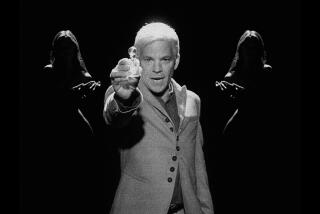Review: Swiss women get the vote (in 1971!) in drama ‘The Divine Order’
The spark igniting the gentle blaze of “The Divine Order,” Switzerland’s submission to the foreign-language Oscar race, is a jaw-dropping historical fact: In 1971, Swiss women were still fighting for the right to vote.
Focusing on the collective awakening of the housewives in an Alpine village, writer-director Petra Volpe fashions a light, crowd-pleasing drama, a genial tale of empowerment that’s underpowered in its more predictable stretches. But Marie Leuenberger is an appealing rooting interest as the modest, married-with-kids Nora, whose determination to get a part-time job isn’t dampened by the legal requirement for her husband’s permission.
During a visit to a larger town, Nora assures a women’s suffrage activist that “I don’t need to be liberated.” Still, she accepts the offering of brochures and a copy of “The Feminist Mystique,” and her communion with the reading material proves life-changing. She stands up to the moralistic leader of the local Anti-Politicization of Women committee — a woman — and joins forces with a feisty widow (Sibylle Brunner) and a spirited Italian divorcee (Marta Zoffoli), whose restaurant becomes HQ for their hamlet’s homegrown sisterhood movement.
Within the story’s sometimes too-neat outline, Volpe lets most of her characters breathe. She doesn’t paint the males with the broad brush of villainy, finding particular nuance in Nora’s husband (Max Simonischek). He undergoes his own awakening, like almost everyone in Nora’s truth-seeking orbit. Within the movie’s optimistic view of benighted but changing times, she’s a believable beacon of light.
-------------
‘The Divine Order’
In Swiss German with English subtitles
Not rated
Running time: 1 hour, 37 minutes
Playing: Laemmle Royal, West L.A.; Laemmle Playhouse 7, Pasadena
See the most-read stories in Entertainment this hour »
Movie Trailers
More to Read
Only good movies
Get the Indie Focus newsletter, Mark Olsen's weekly guide to the world of cinema.
You may occasionally receive promotional content from the Los Angeles Times.









